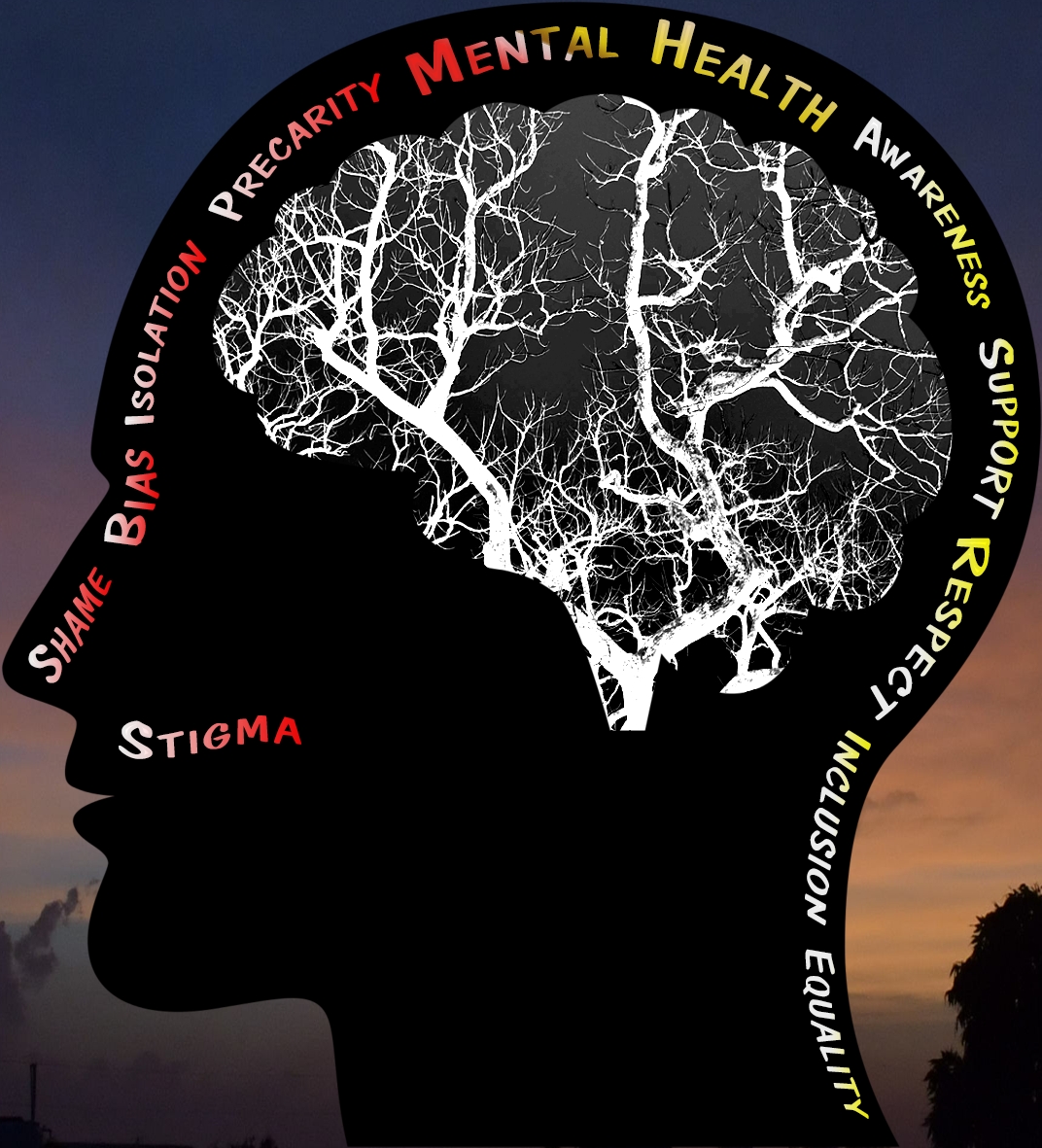Editorial Shun the stigma, normalise mental complexity!
Newsletter
Forever and a day ‘mental health’ has been a taboo topic. The prohibition and restriction surrounding mental well-being is not a cultural or sectorial issue but one that has plagued societies beyond national borders, lifestyle choices and personal ideologies. The concatenation of the above has spilled over all aspects of civilization, hindering human potential and progress.
Mental health stigma, a vicious cycle
Even before developing a mental health disorder, it is possible to adopt a strong public stigma and the negative beliefs surrounding it. Societal stigma breeds discrimination, which, when perceived internally, induces feelings of blame, shame, anxiety and insecurity (The Lancet, 2016). And while emotions like ‘shame, guilt and anxiety ’ are ubiquitous and have been attributed to play a protective role for a functional society (Fessler, 2004), when experienced consistently, can promote aversive effects of social rejection (Leary, 2015).

Toxic shame (Dolezal & Gibson, 2022) fosters feelings of unworthiness, diminishing the sense of self and confidence. When people get consumed in a vortex of self-pity and self-rumination, it gets easier to harbour negative and even violent urges, ceasing social ties, and thereby exacerbating insecurity (Stöber, 2003). Unsurprisingly, insecurity often elevates uncertainty and has a bidirectional relationship with mental illnesses like anxiety and depression (Massazza et al, 2022).
The stigmatisation of mental disorders decreases societal awareness, understanding, and tolerance. The lack of understanding could also manifest feelings of fear and shame, often projected onto others in the form of anger and/or resentment. Such social rejection or neglect enhances the reluctance of marginalised groups battling mental disorders, from seeking help, thus feeding into the vicious loop of stigmatisation (Dolezal, 2022).
Mental health in the context of Academia
Academia has been inundated with hierarchical and systemic challenges. Issues like career and financial precarity, discrimination against underrepresented groups, and high dependence on ‘results-driven’ and ‘publish-or-perish’ culture, have continued to make academia a ‘high-stress’ environment (Orr, 2017). And while some may contest that such precarious and stressful work conditions are not limited to academia, what makes these ‘high-stake’ issues for early-stage researchers (ESRs), is the duration of investment, commitment and sacrifices they make to feel accepted and succeed in this sector.
For university researchers, the aphorism, ‘publish or perish’ has been one of the strongest determinants of academic success(Rawat & Meena, 2014). The pressure to publish research work, that too, in high impact factor journals, has also been the prerequisite for attaining postdoctoral or higher academic positions. Although publishing is considered a moral requirement and often assists in promoting open science, results’ reproducibility and keeping society informed, while also justifying the righteous use of generous funding and tax-payer money, it has been reported to have a deleterious impact on the researchers’ wellbeing and research, itself. The pressure to publish translates to even longer working hours and stress for academics; a quantity-over-quality mentality; and at times even tempering data to make it publishable-reducing scientific integrity; defying the purpose of publications altogether. Not to undermine its effect on the ‘sense of failure’ many researchers feel and internalise, when their research commitment and hard work do not result in a publication (Nature, 2019).
On average, it takes about twelve or more years from graduating high school to earning a PhD degree, which is usually followed by a couple of years of postdoctoral experience in a traditional academic route. So, by the time ESRs enter the ‘real job market’ (although they are highly skilled experts with decades of specialised training and experience), many of them are- in their 30s, financially unsettled, with additional familial responsibilities and no permanent jobs. The sudden shift in priorities combined with financial and career insecurities creates insurmountable turmoil and distress (Silverman et al, 2016), which may affect certain groups of society even more than others (Llorens et al, 2021).
Traditionally, academia has glamourised long-working hours with low pay scales by selling the dream of ‘doing the greater good’ for society. Although some very generous funding schemes are in place (like the Marie Skłodowska-Curie Actions, Erasmus+ and European Research Council fellowships), this isn’t the case for most academics. However, in challenging times of global health crisis and economic inflation, even a strong ‘passion for societal good’ can run dry; resulting in phenomena like the ‘great resignation’, ‘leave academia’ trend and the more recent, ‘work-to rule’ (also known as quiet quitting).
Unequivocally, mental health issues are complex and reforming the foundations of the higher education system is extremely challenging; but in a rapidly evolving society, academia has to adopt contemporary changes to protect, inspire and support its workforce, and preserve fundamental research from being completely overtaken by the private sector.
Reforming academia, every little counts
In addition to the stressors mentioned earlier, some ESRs (especially internationals) may miss having a support network within their universities. The lack of structural and guided support can easily enhance the distress and self-doubts experienced by vulnerable academics making them susceptible victims of bullying, harassment and abuse by those in positions of power (Moss & Mahmoudi, 2021).
Programmes like ‘The European Charter and Code for Researchers (2005)’, ‘The Concordat (2019)’ and ‘Reforming Research Assessment (2022)’ promise improvement in this state of affairs. While these are brilliant initiatives and pave the path for significant reforms, it can be difficult to implement their principles and validate their efficiency at an institutional or individual ‘research group’ level. Therefore, in addition to the above, having university-led initiatives like providing well-being and trauma-informed support; counselling, and guided career development, can facilitate addressing fears and concerns, and safeguarding the mental well-being of academics.
An effective systemic change calls for action(s) by all its stakeholders, including the funders and policy-makers, institutions/ universities, supervisors and researchers. Stakeholder-specific initiatives that can contribute to promoting better research, well-being and work culture, encompass the following:
Funders to-
- Include requirements which promote diverse, equitable and inclusive (DEI) work culture and value researcher well-being in grant proposals, policies, and terms and conditions
- Ensure equality of opportunity for underrepresented groups (like women, people of colour, neurodivergent, people with visible and hidden disabilities, LGBTQ+ and others)
- Include short-term courses for researchers with a focus on career development, mental welfare and resilience
Institutions and Universities to-
- Ensure that their policies are inclusive (DEI), transparent and well-communicated to staff, supervisors and researchers (these could include additional training)
- Promote good mental health practices through efficient people management skills, and provide platforms for supporting, reporting and addressing issues
- Regularly conduct reviews by seeking feedback and adopting appropriate reforms
- Facilitate career development to train, upskill and empower ESRs to prepare for careers within and outside academia
- Provide independent mentors (other than their direct supervisors) so researchers can seek guidance and support in a confidential manner
- Promote reverse mentoring to enhance engagement, new perspectives and active listening with a bottom-up approach
- Address job precarity by considering effective redeployment and open-ended contracts (based on performance and progress reports)
Supervisors/ line managers to-
- Undertake training about DEI principles, people management and empathic leadership
- Create a culture of high research integrity by promoting data transparency, encouraging quality over quantity and healthy competition, while redefining ‘success and failure’ in research
- Support researchers through initiatives like job-share, flexible or hybrid work options (where appropriate) and signposting them to relevant resources
- Encourage an open-communication culture that enhances mental well-being; where researchers feel comfortable sharing everyday challenges and failures and seeking professional support (either within or outside the university)

Researchers to-
- Work by their institution’s principles and values
- Create a supportive and inclusive environment, particularly for new members of the group (including activities like peer-support sessions, coffee catch-ups, lab meetings focused on well-being, having group representatives who regularly check in with team members etc.)
- Report incidents of abuse, bullying, discrimination, harassment or other forms of research misconduct to the appropriate authorities
- Where possible, actively participate in policy development and reforms
- Set realistic expectations, share and normalise research failures, and focus on balancing priorities within and outside research
- Take active measures to prioritise their mental and physical well-being
- Share work amongst colleagues (where possible) and promote team welfare
Learning from adversity
Ensuring society’s health, safety and happiness is a collective initiative. It seems not only unfair but unrealistic to put the onus of addressing ‘mental health’ issues afflicting society, on leaders, institutions, systems or sectors alone. While several academic issues do require bold measures by stakeholders including governments and policy-makers; and some do have more responsibility than others, transforming ‘research culture’ and promoting the ‘mental health of academics’ requires a joint effort.
Academia alone did not breed ‘mental health stigmatisation’. Yes, there are fundamental issues that contribute to exacerbating the stigma within the academic structure; but the narrative used to address the prevailing mental health issues in society has set a toxic precedent.
As responsible beings, it is imperative to understand and accept the responsibility of belonging to a diverse world with-gender, sexual, language, race and cultural differences, neurodivergence, disabilities and a plethora of belief systems. Awareness increases the possibility of understanding and tolerance, which in turn, increases the probability of accepting and respecting others.
Consequently, this MCAA December Special Issue is our collaborative initiative to respectfully, yet strategically dissect and discuss systemic issues; learn from our collective experiences, and methodically pan out robust solutions, while representing and supporting multiple perspectives. And for this, I would like to thank all authors for their contribution in this initiative, my fellow guest editors- Ana Paula Miranda Mendonca and Andrey Zhylka for their invaluable support and hard work, and the entire MCAA newsletter editorial team for their assistance.
A society can only progress if it is mentally and physically healthy. Our moral responsibility is to uplift and support each other, irrespective of our h-indices, academic titles and monetary affluence. As Mahatma Gandhi once said, “We but mirror the world…..We need not wait to see what others do”. Let’s be the change, we want to see in the world!
Pooja Khurana
Co-Guest Editor of the December 2022 Special Issue
MCAA Newsletter, Editorial Board Member
poojakhurana.official@gmail.com
References:
Dolezal, L., & Gibson, M. (2022). Beyond a trauma-informed approach and towards shame-sensitive practice. Humanities and Social Sciences Communications, 9(1). https://doi.org/10.1057/s41599-022-01227-z
Dolezal, L. (2022). Shame anxiety, stigma and clinical encounters. Journal of Evaluation in Clinical Practice, 28(5), 854–860. https://doi.org/10.1111/jep.13744
Fessler, D. M. T. (2004). Shame in two cultures: Implications for evolutionary approaches. Journal of Cognition and Culture. https://doi.org/10.1163/1568537041725097
Leary, M. R. (2015). Emotional responses to interpersonal rejection. Dialogues in Clinical Neuroscience. https://doi.org/10.31887/dcns.2015.17.4/mleary
Llorens, A., et al. (2021). Gender bias in academia: A lifetime problem that needs solutions. Neuron. https://doi.org/10.1016/j.neuron.2021.06.002
Massazza, A., et al. (2022). The association between uncertainty and mental health: a scoping review of the quantitative literature. Journal of Mental Health. https://doi.org/10.1080/09638237.2021.2022620
Moss, S. E., & Mahmoudi, M. (2021). STEM the bullying: An empirical investigation of abusive supervision in academic science. EClinicalMedicine. https://doi.org/10.1016/j.eclinm.2021.101121
Orr, Y. (2017). Too Fast, Too Laborious? Accelerating Academia: The Changing Structure of Academic Time . By Filip Vostal. New York: Palgrave MacMillian, 2016. . Current Anthropology. https://doi.org/10.1086/691965
Rawat, S., & Meena, S. (2014). Publish or perish: Where are we heading? Journal of Research in Medical Sciences. https://www.ncbi.nlm.nih.gov/pmc/articles/PMC3999612/
Silverman, E., Geard, N., & Wood, I. (2016). Job insecurity in academic research employment: An agent-based model. Proceedings of the Artificial Life Conference 2016, ALIFE 2016. https://doi.org/10.7551/978-0-262-33936-0-ch074
Stöber, J. (2003). Self-Pity: Exploring the Links to Personality, Control Beliefs, and Anger. Journal of Personality. https://doi.org/10.1111/1467-6494.7102004
The health crisis of mental health stigma. (2016). The Lancet. https://doi.org/10.1016/S0140-6736(16)00687-5
The mental health of PhD researchers demands urgent attention. (2019). Nature. https://doi.org/10.1038/d41586-019-03489-1